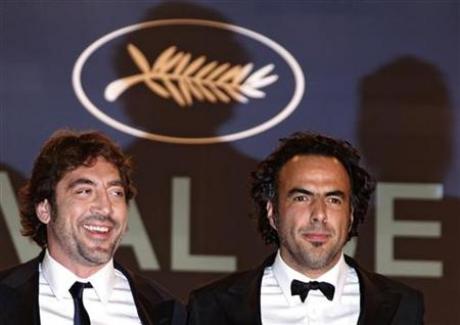


CANNES - Thank goodness for Alejandro Gonzalez Inarritu.
Were it not for the Mexican filmmaker's "Biutiful," a lyrical gem that made a most welcome appearance early Monday at the Cannes Film Festival, this critical assessment of the competition lineup would be filled only with head-scratching.
Because until "Biutiful" showed up, the competition appeared to be a rush to the bottom. That's a little unfair, actually.
Fine work has been on display every day. The performances in Mike Leigh's "Another Year" are ensemble acting at its finest. Many observers are already touting Lesley Manville, who played the film's weepy, bewildered Miss Lonely Hearts, for best actress.
The front-runner before Inarritu's arrival certainly was Bertrand Tavernier. His historical romance "The Princess of Montpensier" has everything going for it -- terrific storytelling, epic battles, palace intrigue, a vibrant cast and superb team work behind the camera. But Cannes juries tend to seek something a little edgier for the coveted Palme d'Or. Tavernier may well get a best director nod, but chairman Tim Burton and his panel undoubtedly are looking for a breakthrough film for its top honor.
Up to this point, every competition film, other than the lamentable gangster film "Outrage" by Takeshi Kitano, has offered pleasures. How great it was to see a film from Chad, Mahamat-Saleh Haroun's, "A Screaming Man," make it to the Croisette. While a modest film that in another year and from another country may have played in the Un Certain Regard sidebar, the drama set in a war-torn society still struggling with its colonial past and politically violent present is nevertheless a worthy film.
If there is a continuing theme to this festival, it's that of fathers seeking to understand the nature of parenthood. "A Screaming Man," like "Chongqing Blues" and "Biutiful," captures the conflicts and challenges of what it means to be a father with telling and, finally, chilling insights.
Following up on his "Beijing Bicycle" and "Shanghai Dreams," Chinese director Wang Xiaoshuai reasserts his status as one of his country's leading international filmmakers with "Chongqing Blues." His dramas play well in festival and international settings thanks to their muted narrative rhythms and keen focus on character. He's not a showy director but digs deeper than many of the flashier filmmakers.
The festival even had amusing soap operas with South Korean Im Sang-soo's "The Housemaid" staking its claim as a high-end, glossy sort of soap with its sleek sets and soft-core sex scenes, while Mathieu Amalric's "On Tour" enjoyed a wallow in the tackier side with goodhearted, zaftig strippers enlivening an otherwise shallow tale of show-biz failure and betrayal.
Yet these films only serve to underscore the pre-festival chatter that Cannes' programmers were unable to produce a lineup of heavyweights for 2010. These entries are perfectly respectable movies with entertainment value -- again we'll exclude "Outrage" -- but ho-hum for a Cannes competition lineup.
So "Biutiful" has come to the rescue. It's hard, for instance, to imagine anyone winning best actor honors other than its star, Javier Bardem. His portrayal of loving father and guilty operator on Barcelona's criminal fringes is a home run with the bases loaded. Bardem carries the film on his sturdy shoulders in just about every moment of every scene.
In his film, Inarritu explores the meaning of fatherhood as a dying man comes to grips with the contradictions and calamities of his life. Like all great movies, "Biutiful" doesn't offer easy answers and indeed sometimes offers no answers at all. Rather it probes and questions. It delivers its portrait of a flawed hero in impressionistic strokes and revelatory incidents. It's the kind of film that makes you realize why coming to Cannes is so essential: This is a place where discoveries are made.